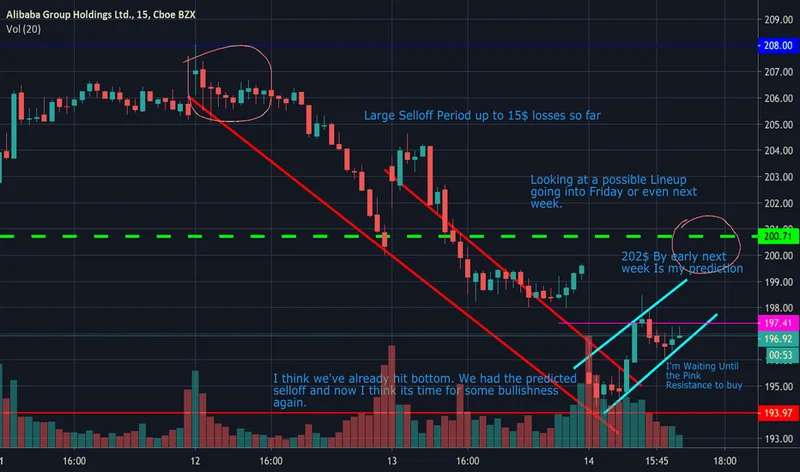Alibaba's Stock Dip: AI Downgrades vs. Market Pressure – What We Know
Alright, folks, let's talk Alibaba (BABA). The news cycle is swirling with reports of military ties and analyst downgrades, and the baba stock price is reflecting that uncertainty. But I'm here to tell you that focusing on these short-term blips is like staring at a single tree and missing the entire, magnificent forest of Alibaba's AI transformation.
Here's the thing: Alibaba isn't just an e-commerce giant anymore. It's rapidly evolving into an AI-powered juggernaut, and the market is drastically underestimating the implications. I mean, look at what's happening under the hood!
The AI Flywheel
The narrative being spun is that Alibaba is facing headwinds. Sure, there are challenges. I read one headline that screamed about a White House memo alleging Alibaba's involvement with the Chinese military. And yeah, Alibaba stock took a hit. But let's be real—geopolitical tensions are practically baked into the baba stock price today. It's the cost of doing business as a global tech leader. As reported by Seeking Alpha, Alibaba dips after White House memo claims it's helping Chinese military target US: report (BABA:NYSE).
But what the bears are missing is the sheer scale of Alibaba's investment in AI. We're talking about a $50 billion plus CapEx cycle focused on data centers, efficient infrastructure, and domestic silicon. $50 Billion! This isn't just throwing money at the wall; it's a strategic, long-term bet on becoming the backbone of China's AI infrastructure.
Think about it this way: It's like the early days of the internet. People were focused on dial-up speeds and clunky websites, missing the revolutionary potential of connecting the entire world. Now, we're seeing the same thing with AI. The focus is on short-term earnings and geopolitical risks, but the real story is the transformative power of AI and Alibaba's central role in it.
And let's talk about those energy subsidies. China's decision to cut energy costs for large data centers is a game changer for Alibaba's cloud and AI ecosystem. It's like discovering a massive new oil field—it fundamentally alters the cost base and gives Alibaba a huge competitive advantage. Suddenly, those AI models become significantly cheaper to run, and Alibaba can scale its operations much more efficiently.

The open-source approach is what really excites me. By promoting developer contributions to smaller, task-oriented models, Alibaba is creating a multiplier effect within its cloud platform. It's like building a massive Lego set where anyone can contribute new pieces. The more developers build, the more valuable the platform becomes, and Alibaba benefits without having to shoulder all the investment burden. This reminds me why I got into this field in the first place.
This ecosystem strategy mirrors its earlier e-commerce model: instead of owning everything end-to-end, Alibaba creates the infrastructure, attracts third-party builders, and benefits from volume and data gravity. This is not merely a copy/paste business model, but a fundamental change in how the company operates.
Analysts keep downgrading the stock, and that's fine. Wall Street often lags behind the curve. The market is still valuing Alibaba as an e-commerce company, not as an AI infrastructure leader, and that creates a massive opportunity for those who see the bigger picture. The AI already accounts for >20% of external cloud customer revenue in Q1, and management expects acceleration. What this means for us is... but more importantly, what could it mean for you?
Of course, we need to be mindful of the ethical considerations. As AI becomes more powerful, it's crucial to ensure that it's used responsibly and ethically. I have a personal reaction to these considerations. When I first saw the demo, I honestly just sat back in my chair, speechless. But power comes with responsibility.
But what if Alibaba's AI revolution delivers even more than what is being projected? What if the consumer-facing Qwen overhaul is successful?
The Dawn of Intelligent Commerce
So, where does this leave us? Alibaba is at the forefront of a paradigm shift. It is not just selling products; it's building the infrastructure for the future of AI-powered commerce. The bears are focused on the trees—the short-term challenges and geopolitical risks—while missing the forest: Alibaba's transformation into an AI powerhouse.
